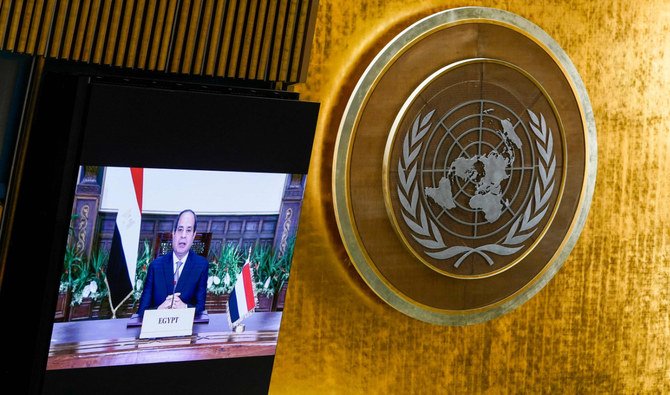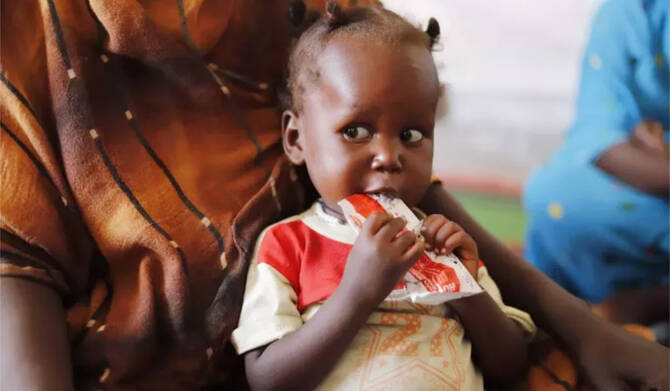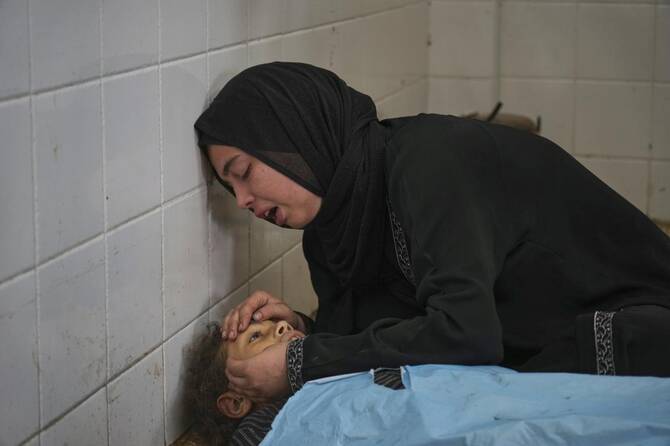Christopher Hamill-Stewart
NEW YORK: The COVID-19 pandemic dominated the first day of speeches by world leaders during the 76th session of the UN General Assembly. But some also took the opportunity to raise the question of Palestinian statehood and express their fears about Iran’s nuclear ambitions.
The leaders of the US, Egypt, Turkey, Qatar and Iran were among the premiers who addressed the UNGA on Tuesday. The speeches continued late into the evening, with many running over their allotted 15-minute slots.
US President Joe Biden declared that the US is back on the world stage and remains committed to multilateralism. As evidence of this he cited the nation’s return to the Paris Climate Agreement and its contribution to the international Covax vaccine-sharing initiative.
“Already, the United States has put more than $15 billion toward the global COVID response,” said Biden, who was making his first in-person speech to the UN as president. “We’ve shipped more than 160 million doses of COVID-19 vaccine to other countries. This includes 130 million doses from our own supply,” with “no strings attached.”
Moving on to other issues, he called for the establishment of a sovereign and independent Palestinian state, saying that this is the “best way” to safeguard Israel’s future.
“We must seek a future of greater peace and security for all people of the Middle East,” Biden said. “The commitment of the United States to Israel’s security is without question, and our support for an independent Jewish state is unequivocal.
“But I continue to believe that a two-state solution is the best way to ensure Israel’s future as a Jewish democratic state, living in peace alongside a viable, sovereign and democratic Palestinian state.
“We’re a long way from that goal at this moment but we should never allow ourselves to give up on the possibility of progress.”
On the issue of Iran’s nuclear program, Biden said: “We’re prepared to return to full compliance (with the 2015 Joint Comprehensive Plan of Action, commonly known as the Iran nuclear deal) if Iran does the same.”
Egyptian President Abdel Fattah El-Sisi also addressed the issue of Palestinian statehood.
“There can be no stability in the Middle East without a just, lasting, and comprehensive solution for the Palestinian question, which remains the central cause of instability for the Arab region,” he said. “This must happen in accordance with international resolutions to establish a Palestinian state along the June 4, 1967 border, with East Jerusalem as its capital.
“Egypt also calls upon the international community to take the necessary measures to improve the living conditions of the Palestinian people.”
Turning his attention to matters closer to home, El-Sisi said Egypt is “immensely proud” of its African identity but decried the lack of progress in negotiations over the Ethiopian Grand Renaissance Dam project. Located upriver on the Nile, Egyptian authorities say it threatens their country’s existence due to its reliance on Nile water.
In his prerecorded speech, Iranian President Ebrahim Raisi, who assumed office this year, took aim at the US over its withdrawal from Afghanistan and the Capitol riots in Washington on Jan. 6, saying that America has “no credibility.”
He also blamed American authorities for causing the COVID-19 crisis in Iran, accusing them of preventing the country from obtaining vaccine supplies. He failed to mention that in January, Iranian Supreme Leader Ali Khamenei banned the import of Western-produced vaccines, falsely claiming they could not be trusted. The ban was subsequently reversed but left Iran facing relentless waves of COVID-19 infections.
Raisi also attempted to convince world leaders that his country does not seek to develop nuclear weapons. “Nukes have no place in our defense doctrine and deterrence policy,” he said.
He also made a plea for sanctions relief, saying: “The Islamic Republic considers useful the talks whose ultimate outcome is the lifting of all oppressive sanctions.”
The leaders of Qatar and Turkey called on the international community to cooperate in delivering vaccines to the world’s most vulnerable countries.
Qatari Emir Tamim bin Hamad Al-Thani also urged the world to take action to fight what he called the “other pandemic:” COVID-19 misinformation.
He also celebrated his country’s return to the fold of Middle East diplomacy in January, after a dispute with a number of neighboring countries, including Saudi Arabia, was resolved through the AlUla declaration.
“We have repeatedly stressed the importance of the Gulf Cooperation Council, and our commitment to settling any differences through constructive dialogue,” he said. “The AlUla declaration came as an embodiment of the principle of settling differences through dialogue.”
Turkish President Recep Tayyip Erdogan said his country would soon start to provide vaccines produced there to the international community. He also echoed the comments by other leaders about the importance of working to find a lasting solution to the Israeli-Palestinian conflict.
Heads of state will continue to address the General Assembly throughout the week. The speech by Saudi Arabia’s King Salman is scheduled to take place on Wednesday.






















